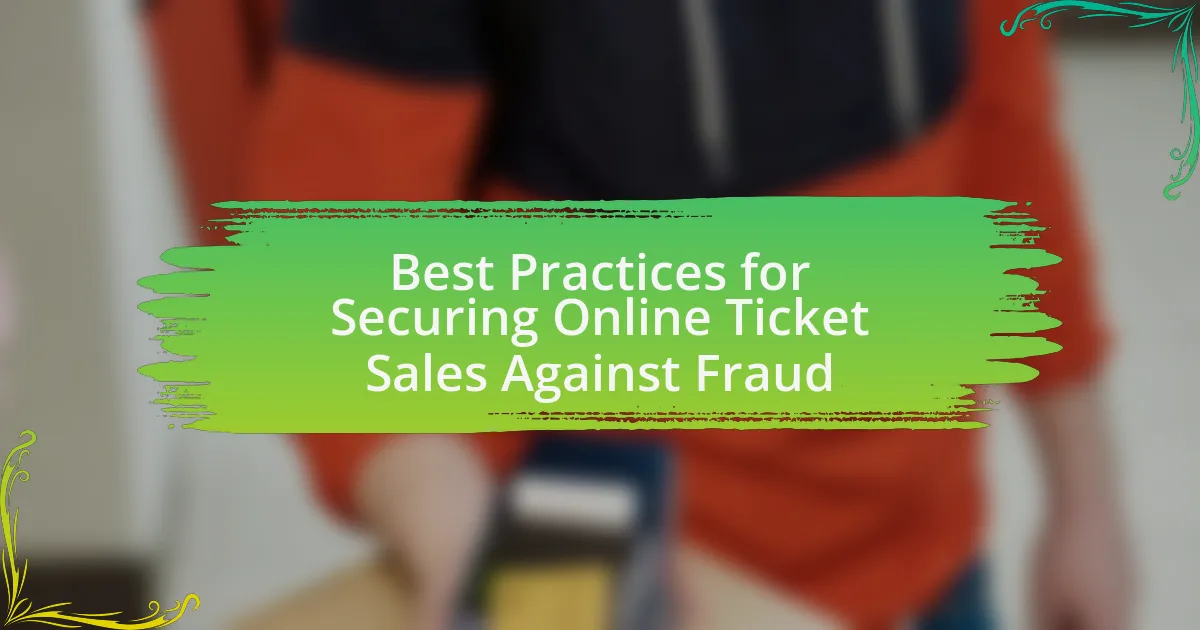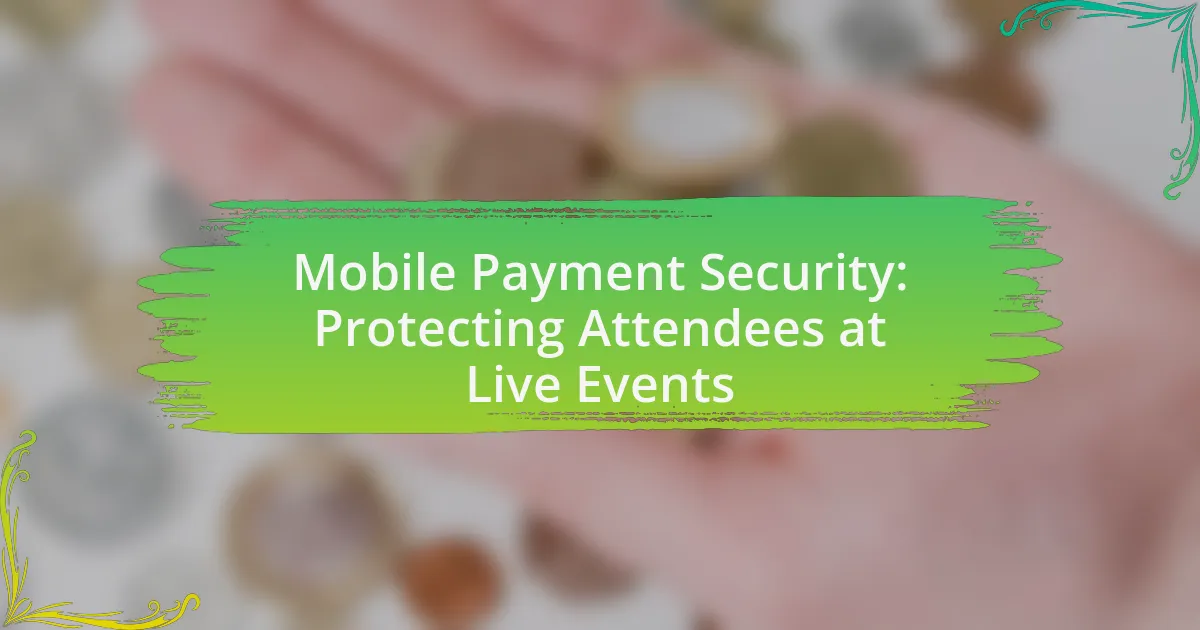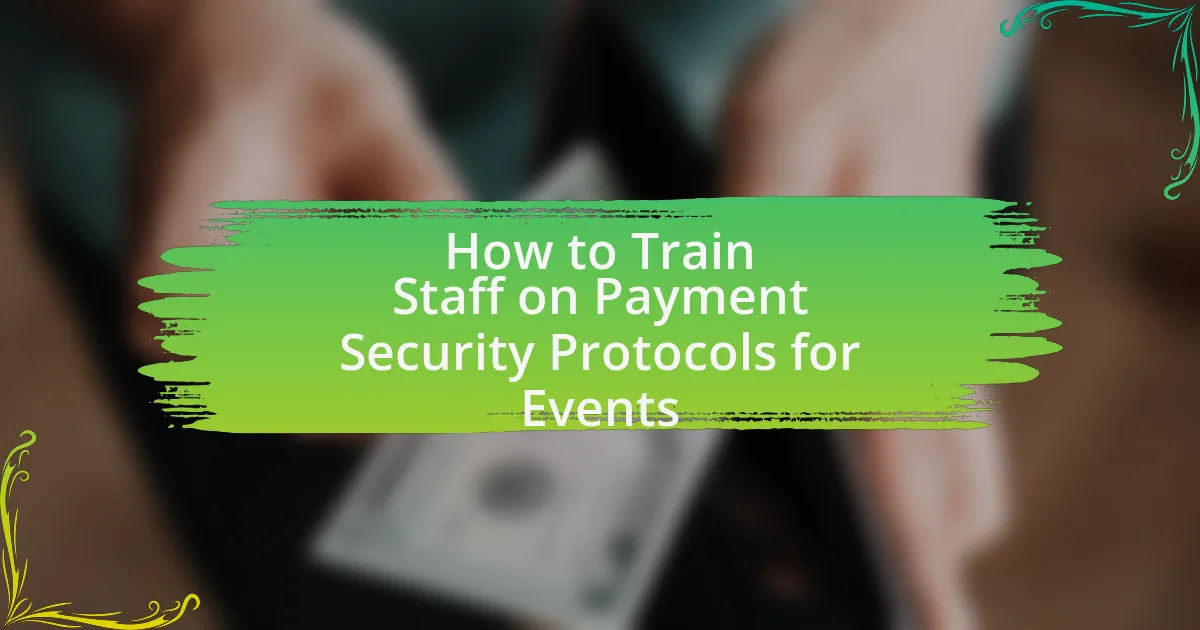PCI Compliance, or adherence to the Payment Card Industry Data Security Standard (PCI DSS), is crucial for event payment processing as it establishes security measures to protect cardholder data during transactions. This article outlines the importance of PCI Compliance for event organizers, detailing the potential risks of non-compliance, including financial penalties and reputational damage. It also discusses the key requirements for achieving compliance, the various levels applicable to different transaction volumes, and best practices for maintaining security. Additionally, the article highlights how PCI Compliance enhances the payment processing experience for attendees, reduces chargebacks and fraud, and influences the selection of payment processors. Finally, it addresses the challenges organizers face in maintaining compliance and offers resources and strategies to overcome these obstacles.
What is PCI Compliance in the Context of Event Payment Processing?

PCI Compliance in the context of event payment processing refers to adherence to the Payment Card Industry Data Security Standard (PCI DSS), which establishes security measures for organizations that handle credit card information. This compliance ensures that event organizers protect cardholder data during transactions, thereby reducing the risk of data breaches and fraud. According to the PCI Security Standards Council, compliance involves implementing specific security controls, such as encryption, access control, and regular security testing, to safeguard sensitive payment information. Failure to comply can result in significant fines and damage to an organization’s reputation, emphasizing the importance of PCI compliance in maintaining trust and security in event payment processing.
Why is PCI Compliance important for event organizers?
PCI Compliance is important for event organizers because it ensures the security of cardholder data during payment processing. By adhering to PCI standards, event organizers protect sensitive information from breaches, which can lead to financial loss and reputational damage. In 2020, the average cost of a data breach was $3.86 million, highlighting the financial risks associated with non-compliance. Additionally, compliance helps build trust with attendees, as they are more likely to engage with events that prioritize their data security.
What are the potential risks of non-compliance for event payment processing?
Non-compliance with event payment processing regulations can lead to significant financial and reputational risks. Organizations may face hefty fines, which can range from thousands to millions of dollars, depending on the severity of the violation and the regulatory body involved. Additionally, non-compliance can result in data breaches, exposing sensitive customer information and leading to costly remediation efforts. According to the Ponemon Institute, the average cost of a data breach in 2021 was $4.24 million, highlighting the financial impact of inadequate compliance measures. Furthermore, businesses may suffer reputational damage, resulting in loss of customer trust and decreased sales, as consumers are increasingly aware of data security issues.
How does PCI Compliance protect customer data during events?
PCI Compliance protects customer data during events by establishing a set of security standards that organizations must follow when handling payment card information. These standards include encryption of data during transmission, secure storage of cardholder information, and regular security testing to identify vulnerabilities. For instance, compliance requires that sensitive data is encrypted both in transit and at rest, significantly reducing the risk of data breaches. Additionally, organizations must implement access controls and monitoring systems to detect unauthorized access, further safeguarding customer information during events.
What are the key requirements of PCI Compliance?
The key requirements of PCI Compliance include maintaining a secure network, protecting cardholder data, implementing strong access control measures, regularly monitoring and testing networks, and maintaining an information security policy. Specifically, organizations must adhere to the PCI Data Security Standard (DSS), which outlines 12 requirements categorized into six goals: build and maintain a secure network and systems, protect cardholder data, maintain a vulnerability management program, implement strong access control measures, regularly monitor and test networks, and maintain an information security policy. Compliance with these requirements is essential for safeguarding sensitive payment information and reducing the risk of data breaches.
What are the different levels of PCI Compliance applicable to event payment processing?
The different levels of PCI Compliance applicable to event payment processing are categorized into four levels based on the volume of transactions processed annually. Level 1 applies to merchants processing over 6 million transactions per year and requires a full PCI DSS assessment by a Qualified Security Assessor. Level 2 is for merchants processing 1 to 6 million transactions annually, requiring a self-assessment questionnaire and vulnerability scans. Level 3 applies to those processing 20,000 to 1 million e-commerce transactions per year, also requiring a self-assessment questionnaire. Level 4 is for merchants processing fewer than 20,000 e-commerce transactions and all other merchants processing up to 1 million transactions, which requires a self-assessment questionnaire but no formal assessment. These levels ensure that payment processing entities adhere to security standards to protect cardholder data.
How can event organizers ensure they meet PCI Compliance requirements?
Event organizers can ensure they meet PCI Compliance requirements by implementing secure payment processing systems that adhere to the PCI Data Security Standards (DSS). This involves conducting a thorough assessment of their payment systems, ensuring encryption of cardholder data, and maintaining a secure network infrastructure. Additionally, event organizers should regularly train staff on security protocols and conduct vulnerability scans to identify and mitigate potential risks. Compliance can be validated through self-assessment questionnaires or by engaging a Qualified Security Assessor (QSA) to perform an audit, ensuring adherence to the standards set forth by the PCI Security Standards Council.
How does PCI Compliance impact the payment processing experience at events?

PCI Compliance significantly enhances the payment processing experience at events by ensuring the security of cardholder data. This compliance mandates that event organizers implement stringent security measures, such as encryption and secure networks, which protect sensitive information during transactions. As a result, attendees feel more secure when making payments, leading to increased trust and potentially higher sales. According to the Payment Card Industry Security Standards Council, organizations that adhere to PCI standards reduce the risk of data breaches, which can have severe financial and reputational consequences. Thus, PCI Compliance not only safeguards data but also fosters a smoother and more reliable payment experience at events.
What are the benefits of PCI Compliance for event attendees?
PCI Compliance provides significant benefits for event attendees by ensuring the security of their payment information during transactions. This compliance mandates strict security measures that protect sensitive data, reducing the risk of data breaches and fraud. For instance, organizations that adhere to PCI standards are required to implement encryption and secure networks, which directly safeguards attendees’ credit card details. According to the PCI Security Standards Council, compliance can lead to a 50% reduction in the likelihood of a data breach, enhancing attendees’ trust in the event’s payment processes. This increased security not only protects attendees but also fosters a safer overall event experience.
How does PCI Compliance enhance trust and security for event participants?
PCI Compliance enhances trust and security for event participants by ensuring that organizations handling payment information adhere to strict security standards. These standards, established by the Payment Card Industry Security Standards Council, require businesses to implement robust security measures, such as encryption and access controls, to protect sensitive data. As a result, participants feel more secure knowing that their financial information is being handled in a secure environment, which can lead to increased participation and revenue for events. Studies have shown that organizations that are PCI compliant experience fewer data breaches, further reinforcing the trust of event participants in the payment processing system.
What role does PCI Compliance play in reducing chargebacks and fraud?
PCI Compliance plays a critical role in reducing chargebacks and fraud by establishing security standards that protect cardholder data during transactions. By adhering to these standards, businesses minimize vulnerabilities that fraudsters exploit, thereby decreasing the likelihood of unauthorized transactions. For instance, according to the 2021 Verizon Payment Security Report, organizations that maintain PCI Compliance experience 80% fewer security breaches compared to those that do not. This reduction in breaches directly correlates with fewer instances of chargebacks, as secure transactions lead to increased consumer trust and lower fraud rates.
How does PCI Compliance affect the choice of payment processors for events?
PCI Compliance significantly influences the selection of payment processors for events by ensuring that any processor chosen adheres to strict security standards for handling credit card information. Event organizers must prioritize processors that are PCI compliant to protect sensitive customer data and minimize the risk of data breaches. Non-compliance can lead to severe penalties, including fines and increased liability for fraudulent transactions. According to the PCI Security Standards Council, compliance with PCI standards reduces the risk of data breaches by up to 80%, making it a critical factor in the decision-making process for event payment processing.
What should event organizers look for in a PCI-compliant payment processor?
Event organizers should look for a PCI-compliant payment processor that ensures the security of cardholder data through encryption and tokenization. A processor must demonstrate adherence to the Payment Card Industry Data Security Standards (PCI DSS), which includes maintaining a secure network, implementing strong access control measures, and regularly monitoring and testing networks. Compliance with these standards minimizes the risk of data breaches and protects sensitive information, which is crucial for maintaining customer trust and avoiding potential financial penalties.
How can event organizers evaluate the PCI Compliance of their payment processing partners?
Event organizers can evaluate the PCI Compliance of their payment processing partners by reviewing the partner’s PCI DSS (Payment Card Industry Data Security Standard) certification status. This certification indicates that the payment processor adheres to the security standards set by the PCI Security Standards Council, which includes requirements for securing cardholder data, maintaining a secure network, and implementing strong access control measures.
To verify compliance, organizers should request documentation of the payment processor’s PCI DSS compliance, such as the Attestation of Compliance (AOC) form, which is provided by a Qualified Security Assessor (QSA). Additionally, organizers can check the PCI Security Standards Council’s website for a list of compliant service providers. This process ensures that the payment processing partner meets the necessary security standards to protect sensitive payment information during events.
What are the challenges of maintaining PCI Compliance in event payment processing?

Maintaining PCI Compliance in event payment processing presents several challenges, including the complexity of compliance requirements, the need for continuous monitoring, and the potential for human error. The PCI Data Security Standard (DSS) outlines specific security measures that organizations must implement, which can be intricate and resource-intensive to maintain. Continuous monitoring is essential to ensure that all systems remain compliant, requiring dedicated personnel and technology investments. Additionally, human error during payment processing can lead to data breaches, making it crucial for staff to be adequately trained and vigilant. According to the 2022 Verizon Data Breach Investigations Report, 82% of data breaches involved a human element, highlighting the importance of addressing this challenge in the context of PCI Compliance.
What common pitfalls do event organizers face regarding PCI Compliance?
Event organizers commonly face several pitfalls regarding PCI Compliance, including inadequate training for staff, failure to secure payment data, and lack of regular audits. Inadequate training can lead to employees mishandling sensitive information, increasing the risk of data breaches. Failure to secure payment data often results from not using encryption or secure payment gateways, which are essential for protecting cardholder information. Additionally, the lack of regular audits can prevent organizers from identifying vulnerabilities in their payment processing systems, leaving them exposed to compliance violations. These pitfalls can lead to significant financial penalties and damage to reputation, highlighting the importance of thorough compliance practices in event payment processing.
How can event organizers overcome these challenges?
Event organizers can overcome challenges related to PCI compliance by implementing robust security measures and ensuring staff training on payment processing protocols. By adopting encryption technologies and secure payment gateways, organizers can protect sensitive cardholder data during transactions. Additionally, regular audits and compliance checks can help identify vulnerabilities and ensure adherence to PCI standards. According to the PCI Security Standards Council, organizations that maintain compliance reduce the risk of data breaches by up to 80%.
What resources are available to assist with PCI Compliance in event payment processing?
Resources available to assist with PCI Compliance in event payment processing include the PCI Security Standards Council’s official guidelines, which provide comprehensive documentation on compliance requirements. Additionally, organizations can utilize PCI compliance assessment tools and checklists available from various cybersecurity firms, which help identify gaps in compliance. Consulting services from firms specializing in PCI compliance can also offer tailored support and guidance. Furthermore, training programs and webinars focused on PCI compliance are available to educate staff involved in payment processing. These resources collectively ensure that organizations can effectively meet PCI compliance standards in their event payment processing activities.
What best practices should event organizers follow to ensure PCI Compliance?
Event organizers should implement several best practices to ensure PCI Compliance, including conducting regular security assessments, using secure payment processing systems, and training staff on data security. Regular security assessments help identify vulnerabilities in the payment processing environment, while secure payment systems, such as those that tokenize card information, reduce the risk of data breaches. Additionally, training staff on data security protocols ensures that everyone involved understands the importance of protecting cardholder data. Following these practices is essential, as non-compliance can lead to significant fines and damage to reputation.
How can regular training and updates help maintain PCI Compliance?
Regular training and updates are essential for maintaining PCI Compliance as they ensure that employees are aware of the latest security protocols and best practices. Continuous education helps staff recognize potential security threats and understand their roles in protecting cardholder data, which is a critical requirement of PCI standards. According to the PCI Security Standards Council, organizations that implement regular training programs see a significant reduction in security breaches, as informed employees are better equipped to follow compliance measures effectively.
What role does technology play in achieving and maintaining PCI Compliance?
Technology plays a crucial role in achieving and maintaining PCI Compliance by providing the necessary tools and systems to secure payment data. These technologies include encryption, tokenization, and secure network architecture, which protect sensitive cardholder information during transactions. For instance, encryption transforms data into a secure format that can only be read by authorized parties, while tokenization replaces sensitive data with unique identifiers, reducing the risk of data breaches. Additionally, security monitoring tools help organizations detect and respond to potential threats in real-time, ensuring ongoing compliance with PCI standards. According to the PCI Security Standards Council, implementing these technologies is essential for safeguarding payment information and maintaining compliance, as they address specific requirements outlined in the PCI Data Security Standard (DSS).
What are the next steps for event organizers to enhance PCI Compliance?
Event organizers can enhance PCI Compliance by implementing robust security measures, conducting regular training for staff, and performing thorough audits of payment processing systems. These steps ensure that sensitive payment information is protected and that all personnel are aware of compliance requirements. Regularly updating security protocols, such as encryption and tokenization, further safeguards data during transactions. Additionally, maintaining documentation of compliance efforts and engaging with PCI Qualified Security Assessors can provide further validation of adherence to PCI standards.






